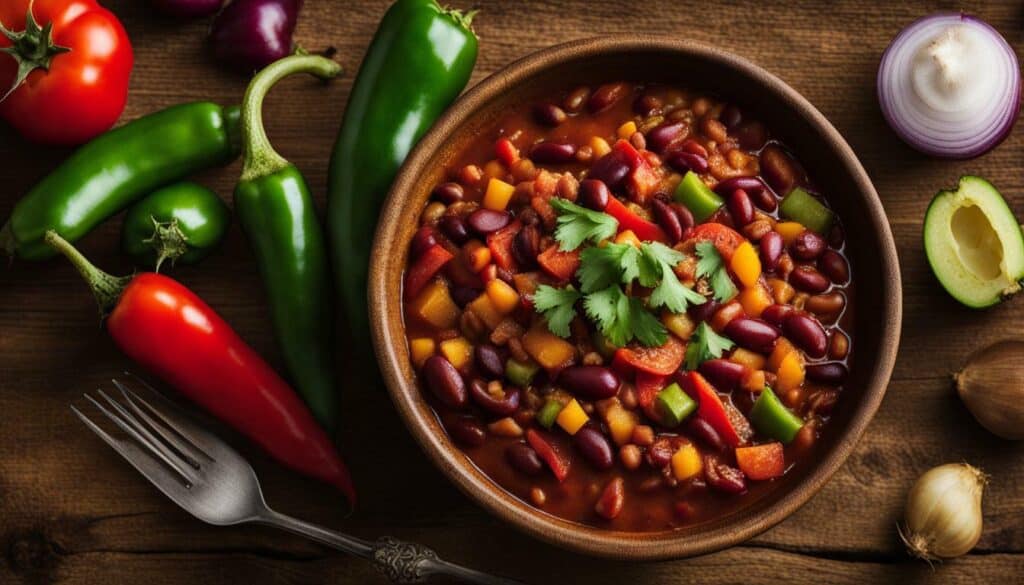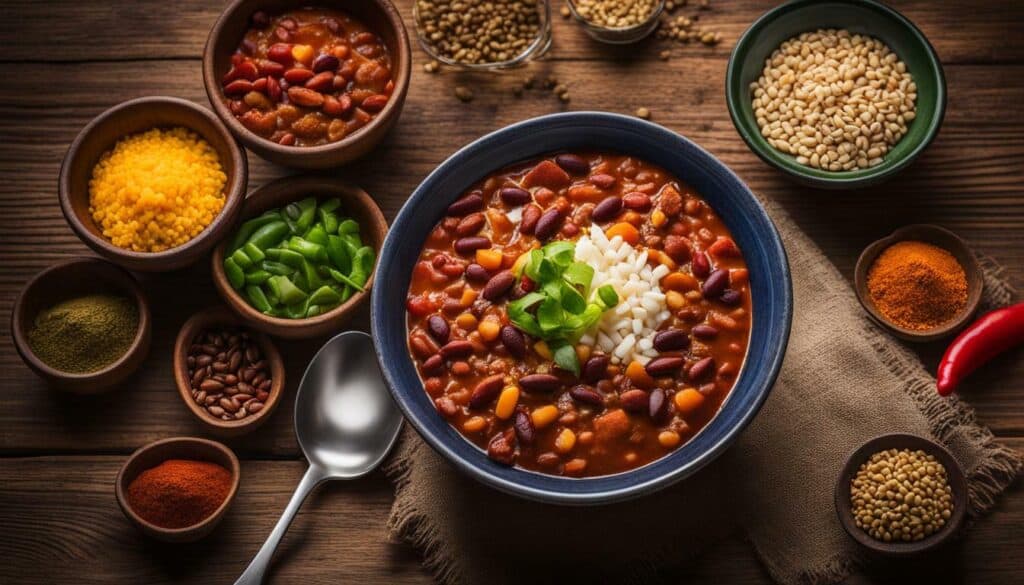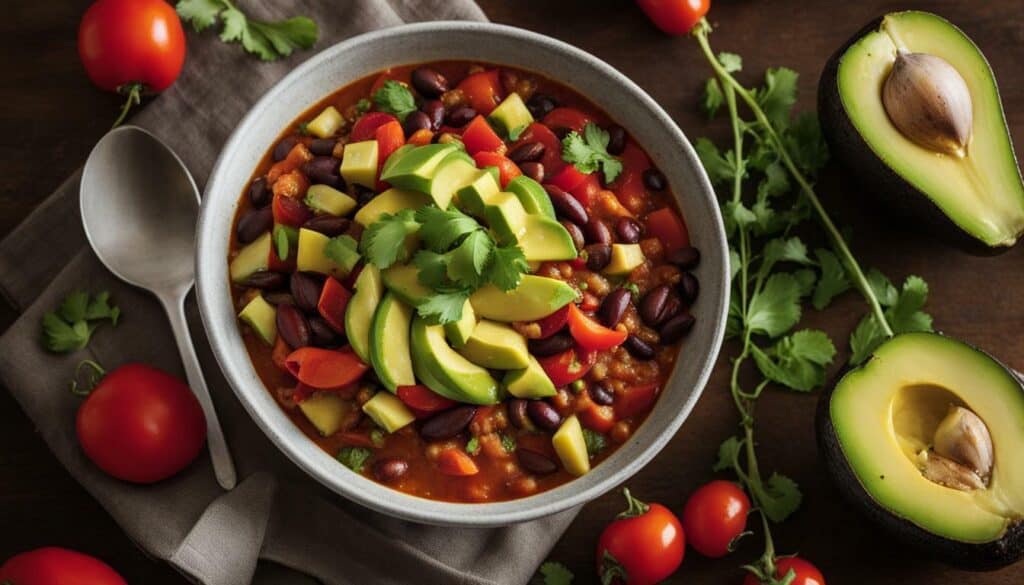Welcome to the comprehensive guide on vegetarian chili’s nutritional information. Get ready to discover the healthful benefits this hearty, meatless dish offers. Whether you’re a vegetarian, looking to incorporate more plant-based meals into your diet, or simply curious about the nutritional value of vegetarian chili, this article will provide you with all the necessary details. From calories to vitamins, minerals to dietary fiber, we’ll explore the complete nutritional profile of this delicious and nutritious dish.
Key Takeaways:
- Vegetarian chili is a satisfying, meatless option that offers numerous health benefits.
- A 254g serving of vegetarian chili contains approximately 272 calories.
- It is a good source of protein, providing 18.9g per serving.
- With 11.2g of fiber, vegetarian chili promotes digestive health.
- It is packed with essential minerals like iron, potassium, and zinc.
- Vegetarian chili is also a great source of vitamins such as vitamin C, vitamin B6, and folate.
- By incorporating vegetarian chili into your diet, you can enjoy a nutritious meal that is both delicious and beneficial for your overall well-being.
Now that we’ve provided an overview, let’s dive deeper into the specific nutritional components of vegetarian chili. In the following sections, we’ll explore its calorie content, protein, vitamins, minerals, dietary fiber, fat, and carbohydrates. Stay with us to uncover the nutritional secrets of this popular meatless dish!
The Calories in Vegetarian Chili
Let’s start by exploring the calorie count in a serving of vegetarian chili, a key factor in understanding its nutritional value. Each 254g serving of vegetarian chili contains approximately 272 calories. This means that enjoying a bowl of this flavorful dish can provide you with a satisfying meal without adding excessive calories to your daily intake.
While the calorie content may vary slightly depending on the specific ingredients used in the recipe, vegetarian chili remains a relatively low-calorie option compared to many other comfort foods. By incorporating vegetarian chili into your diet, you can indulge in a tasty and filling meal while still maintaining a balanced caloric intake.
Keep in mind that the calorie content of vegetarian chili can be further reduced by adjusting ingredient portions or opting for lower-calorie alternatives. For example, substituting beans in place of meat can significantly reduce the overall calorie count while adding a healthy dose of fiber and protein.

Understanding the calorie content in vegetarian chili is essential for individuals who are mindful of their calorie intake. By being aware of the calories you consume, you can make informed choices that align with your dietary goals. Whether you’re looking to maintain a healthy weight, lose weight, or simply nourish your body with nutritious meals, keeping track of your calorie consumption is key.
Aside from calories, vegetarian chili also contains various essential nutrients, including protein, fiber, vitamins, and minerals. These nutrients contribute to a well-rounded and balanced diet, making vegetarian chili an excellent choice for those seeking a wholesome and satisfying meal.
The Nutritional Profile of Vegetarian Chili
While calorie content is an important consideration, the nutritional benefits of vegetarian chili extend beyond calories alone. This mouthwatering dish is packed with vital macronutrients and micronutrients that are crucial for supporting overall health and wellbeing.
Below is a table that displays the detailed nutritional information of a 254g serving of vegetarian chili:
| Nutrient | Amount per Serving | % Daily Value (DV) |
|---|---|---|
| Calories | 272 | |
| Fat | 7.4g | 10% DV |
| Protein | 18.9g | 38% DV |
| Carbohydrate | 35.3g | 13% DV |
| Sugars | 6.5g | |
| Fiber | 11.2g | 40% DV |
| Cholesterol | 0mg | |
| Saturated Fats | 1.2g | 6% DV |
| Net-Carbs | 24.1g |
As demonstrated, vegetarian chili offers a balanced combination of macronutrients, with a significant protein content and a moderate carbohydrate profile. Additionally, it provides a generous amount of dietary fiber, which aids in digestion and promotes overall gut health. The presence of essential vitamins and minerals further enhances the nutritional value of this hearty dish.
By incorporating vegetarian chili into your diet, you can enjoy a delicious and nutritious meal that not only satisfies your taste buds but also nourishes your body with essential nutrients.
The Protein Content of Vegetarian Chili
One important aspect to consider when analyzing the nutritional profile of vegetarian chili is its protein content, which plays a crucial role in maintaining overall health. Protein is known as the building block of life as it is essential for the growth, repair, and maintenance of our body’s tissues.
Vegetarian chili is a great source of plant-based protein, making it an excellent option for vegetarians and vegans looking to meet their protein needs. In a serving size of 254g, vegetarian chili provides approximately 18.9g of protein, which accounts for 38% of the recommended daily value (DV). This protein content is comparable to other protein-rich foods like legumes, tofu, and seitan.
The protein in vegetarian chili comes from a combination of ingredients such as beans, lentils, and textured vegetable protein (TVP). These plant-based protein sources are not only rich in protein but also contain essential amino acids that our body needs for optimal functioning. Amino acids are the building blocks of protein and are involved in various physiological processes, including muscle repair and synthesis, immune function, and hormone production.
By including vegetarian chili in your diet, you can easily meet your daily protein requirements while enjoying a delicious and nutritious meal. Whether you’re following a vegetarian or vegan lifestyle or simply looking to incorporate more plant-based meals into your diet, vegetarian chili is a protein-packed option that can support your overall health and well-being.

A Complete Nutritional Profile
However, protein is not the only nutritional factor to consider when evaluating the benefits of vegetarian chili. It is also important to understand the full range of macronutrients, vitamins, and minerals that contribute to its overall nutritional value. Here is a complete breakdown of the nutritional content found in a 254g serving of vegetarian chili:
| Macronutrients | Amount per Serving | % Daily Value (DV) |
|---|---|---|
| Calories | 272 | |
| Fat | 7.4g | 10% |
| Protein | 18.9g | 38% |
| Carbohydrate | 35.3g | 13% |
| Sugars | 6.5g | |
| Fiber | 11.2g | 40% |
| Cholesterol | 0mg | |
| Saturated Fats | 1.2g | 6% |
| Net-Carbs | 24.1g |
Vegetarian chili is not only a tasty and satisfying dish, but it also provides a well-rounded combination of macronutrients, vitamins, and minerals necessary for maintaining a balanced diet. By incorporating vegetarian chili into your meals, you can enjoy a delicious plant-based option that nourishes your body and supports your overall well-being.
The Vitamin Content in Vegetarian Chili
Packed with essential vitamins, vegetarian chili is an excellent source of natural nutrients that support our body’s well-being. This flavorful dish not only satisfies our taste buds but also nourishes our body with a variety of vitamins that contribute to a healthy lifestyle.
One serving of vegetarian chili provides us with a significant amount of vitamins, including vitamin A, vitamin C, and various B vitamins. Vitamin A is essential for maintaining good vision, a strong immune system, and healthy skin. Vitamin C acts as a powerful antioxidant, supporting our immune system and promoting collagen production for skin health. The B vitamins found in vegetarian chili, such as thiamin, riboflavin, niacin, and vitamin B6, play a crucial role in energy metabolism and brain function.
To give you a better understanding of the vitamin content in vegetarian chili, here is a breakdown of the key vitamins per serving:
| Vitamin | Amount Per Serving | % Daily Value (DV) |
|---|---|---|
| Vitamin A | 48.3mcg | 5% |
| Vitamin C | 12.4mg | 14% |
| Thiamin (B1) | 0.5mg | 46% |
| Riboflavin (B2) | 0.4mg | 30% |
| Niacin (B3) | 6.3mg | 39% |
| Vitamin B6 | 0.8mg | 46% |
| Folate (B9) | 154.9mcg | 39% |
| Vitamin B12 | 1mcg | 43% |
| Vitamin E | 3.5mg | 23% |
| Vitamin K | 13mcg | 11% |
Including vegetarian chili in your diet can help you meet your daily vitamin needs. Whether you’re looking to boost your immune system, maintain healthy skin, or support energy production, the vitamins in vegetarian chili have got you covered.

Remember, a balanced diet is key to overall well-being, and vegetarian chili can be a delicious and nutritious addition to your meals. Explore different recipes and variations to find the one that suits your taste buds and dietary preferences. Enjoy the benefits of vegetarian chili and nourish your body with its vitamin-rich goodness.
The Mineral Content in Vegetarian Chili
In addition to vitamins, vegetarian chili also provides an array of minerals that are vital for various bodily functions. Let’s take a closer look at the mineral content found in this flavorful dish:
| Mineral | Amount per 254g serving | % Daily Value (DV) |
|---|---|---|
| Calcium | 66mg | 5% |
| Iron | 5.5mg | 31% |
| Potassium | 922mg | 20% |
| Magnesium | 73.7mg | 18% |
| Phosphorus | 327.7mg | 26% |
| Sodium | 629.7mg | 27% |
| Zinc | 2.2mg | 20% |
| Copper | 0.8mg | 91% |
| Selenium | 2.5mcg | 5% |
These minerals play crucial roles in supporting overall health. For example, calcium is essential for strong bones and teeth, while iron is necessary for the production of red blood cells. Potassium helps maintain healthy blood pressure levels, and magnesium is involved in numerous biochemical reactions in the body.
Phosphorus is crucial for energy production and the formation of DNA, while sodium plays a role in maintaining fluid balance. Zinc is important for immune function and wound healing, and copper is involved in the production of collagen and red blood cells. Lastly, selenium acts as an antioxidant and supports the immune system.
By including vegetarian chili in your diet, you can benefit from these important minerals, contributing to your overall well-being. So dig in and enjoy the delicious flavors while nourishing your body!

Did you know that vegetarian chili is an excellent source of dietary fiber? Let’s delve into the benefits of this essential nutrient. Dietary fiber plays a crucial role in maintaining a healthy digestive system and overall well-being.
Fiber is a type of carbohydrate found in plant-based foods like beans, vegetables, and whole grains. It is not digested by the body, passing through the digestive tract relatively intact. This means that it adds bulk to your stool, promoting regular bowel movements and preventing constipation. Additionally, fiber helps to regulate blood sugar levels, lower cholesterol, and promote a feeling of fullness, which can aid in weight management.
In a serving of vegetarian chili weighing 254g, you can find a substantial 11.2g of dietary fiber. This accounts for 40% of the recommended daily value (DV). The high fiber content in vegetarian chili makes it a satisfying meal that can help keep you full longer and support a healthy digestive system.
| Dietary Fiber (per 254g serving) | Amount | % Daily Value |
|---|---|---|
| Total Dietary Fiber | 11.2g | 40% |
Including vegetarian chili in your diet is a tasty way to boost your fiber intake and reap the rewards of this essential nutrient. So why not try a hearty bowl of vegetarian chili packed with protein, vitamins, minerals, and, of course, dietary fiber? Your taste buds and your digestive system will thank you!

Remember, the nutritional information for vegetarian chili provided here is based on a serving size of 254g. It’s always a good idea to check the labels of specific brands or homemade recipes for accurate information. Enjoy the benefits of vegetarian chili and make it a regular addition to your menu for a fiber-rich and satisfying meal option!
The Fat Content in Vegetarian Chili
Even though vegetarian chili is a low-fat dish, it still contains a moderate amount of fats that contribute to its overall taste and nutritional profile. The fat content in vegetarian chili comes primarily from plant-based sources, such as olive oil or coconut oil, which are known for their heart-healthy properties.
While the exact fat content may vary depending on the recipe and ingredients used, a typical serving of vegetarian chili contains approximately 7.4 grams of fat. This amounts to about 10% of the recommended daily value (DV) for fat intake, making it a relatively healthy choice for those watching their fat intake.
It’s important to note that not all fats are created equal. Vegetarian chili is generally low in saturated fats, with only 1.2 grams per serving, which contributes to just 6% of the DV. Saturated fats are the type of fats that can increase cholesterol levels and the risk of heart disease. By choosing vegetarian chili, you can enjoy a flavorful meal while keeping your saturated fat intake in check.
Additionally, vegetarian chili typically contains no cholesterol, making it a suitable option for those following a heart-healthy diet. The dish is also rich in dietary fiber, with 11.2 grams per serving, helping to promote digestive health and provide a feeling of fullness.
| Macronutrients (per 254g serving) | Amount | % Daily Value (DV) |
|---|---|---|
| Fat | 7.4g | 10% |
| Saturated Fats | 1.2g | 6% |
| Fiber | 11.2g | 40% |
| Cholesterol | 0mg | – |
So, if you’re looking for a tasty and nutritious meal option, vegetarian chili is an excellent choice. It provides a moderate amount of fats, primarily from healthy plant-based sources, and is low in saturated fats and cholesterol. Plus, the high fiber content adds to its nutritional value and promotes a healthy digestive system.

- US Department of Agriculture, Agricultural Research Service. (2019). FoodData Central. Retrieved from https://fdc.nal.usda.gov/
- Mayo Clinic. (2021). Dietary fats: Know which types to choose. Retrieved from https://www.mayoclinic.org/healthy-lifestyle/nutrition-and-healthy-eating/in-depth/fat/art-20045550
The Carbohydrate Content of Vegetarian Chili
Carbohydrates are a key macronutrient found in vegetarian chili, supplying us with the energy we need to power through the day. In a 254g serving of vegetarian chili, you’ll find approximately 35.3g of carbohydrates. These carbohydrates come from various sources, including the beans, vegetables, and spices used in the chili.
Not all carbohydrates are created equal, and the carbohydrates in vegetarian chili are primarily complex carbohydrates. Complex carbohydrates are digested more slowly by the body, providing a steady release of energy over time. This makes vegetarian chili a great choice for sustained energy throughout the day.
Additionally, vegetarian chili is a good source of dietary fiber, with a 254g serving containing approximately 11.2g of fiber. Fiber is a type of carbohydrate that is not fully digested by the body, but it plays a crucial role in our digestive health. It helps regulate bowel movements, promotes a feeling of fullness, and can even help lower cholesterol levels.
When incorporating vegetarian chili into your diet, it’s important to consider the serving size and your individual nutritional needs. If you’re looking to increase your carbohydrate intake, you can pair vegetarian chili with whole grains, such as brown rice or quinoa, for a more substantial meal. Alternatively, if you’re following a low-carbohydrate diet, you can adjust your serving size accordingly.
Table 8.1: Carbohydrate Content of Vegetarian Chili
| Carbohydrate | Amount per 254g Serving | % Daily Value (DV) |
|---|---|---|
| Total Carbohydrate | 35.3g | 13% |
| Sugars | 6.5g | |
| Dietary Fiber | 11.2g | 40% |
By understanding the carbohydrate content of vegetarian chili, you can make informed decisions about incorporating it into your diet. Whether you’re looking for a hearty meal to fuel your day or a nutritious option to support your overall health, vegetarian chili can be a delicious and satisfying choice.

Ready to create your own delicious and nutritious vegetarian chili? Follow this simple recipe and savor the flavors of a plant-based meal.
Ingredients:
- 1 tablespoon olive oil
- 1 onion, diced
- 3 cloves garlic, minced
- 1 bell pepper, diced
- 2 carrots, diced
- 1 zucchini, diced
- 1 can (15 ounces) kidney beans, drained and rinsed
- 1 can (15 ounces) black beans, drained and rinsed
- 1 can (15 ounces) diced tomatoes
- 1 cup vegetable broth
- 2 tablespoons chili powder
- 1 teaspoon cumin
- 1 teaspoon paprika
- Salt and pepper to taste
Instructions:
- In a large pot, heat olive oil over medium heat. Add the onion and garlic, and sauté until fragrant and translucent.
- Add the bell pepper, carrots, and zucchini to the pot. Cook for a few minutes, until the vegetables begin to soften.
- Add the kidney beans, black beans, diced tomatoes, vegetable broth, chili powder, cumin, and paprika. Stir well to combine.
- Bring the chili to a boil, then reduce heat to low. Simmer uncovered for 20-30 minutes, stirring occasionally.
- Taste and season with salt and pepper as desired.
- Serve hot with your choice of toppings, such as avocado slices, chopped cilantro, or a dollop of vegan sour cream.
Enjoy this hearty and nutritious vegetarian chili, packed with protein, fiber, vitamins, and minerals. It’s a satisfying dish that will keep you warm and nourished. Give it a try and discover the deliciousness of plant-based eating!

Conclusion
By uncovering the nutritional information of vegetarian chili, we can make informed choices that promote a healthy lifestyle and a more sustainable future. Understanding the macronutrients, minerals, and vitamins present in this delicious dish allows us to appreciate its nourishing qualities and incorporate it into our diet with confidence.
With only 272 calories per 254g serving, vegetarian chili provides a satisfying and flavorful meal option that is low in fat and cholesterol-free. It contains a substantial amount of protein, 18.9g, making it an excellent choice for those seeking plant-based protein sources. Additionally, its high dietary fiber content of 11.2g supports healthy digestion and contributes to a feeling of fullness.
Vegetarian chili is not only packed with macronutrients, but it also offers an array of beneficial minerals and vitamins. Its significant contributions of potassium, iron, magnesium, and phosphorus support various bodily functions and help maintain overall health. Moreover, the vitamins present, such as vitamin C, B vitamins, and vitamin K, contribute to a well-rounded nutritional profile.
With its rich flavor, robust nutritional content, and versatility in preparation, vegetarian chili is an ideal addition to any weekly meal plan. So why not try making it yourself? Check out the included vegetarian chili recipe to discover a tasty and nutritious way to incorporate this hearty dish into your culinary repertoire.
FAQ
Q: What is the nutritional information for vegetarian chili?
A: The nutritional information for vegetarian chili includes macronutrients like calories, fat, protein, carbohydrates, sugars, fiber, cholesterol, saturated fats, and net-carbs. It also includes minerals such as calcium, iron, potassium, magnesium, phosphorus, sodium, zinc, copper, and selenium. Additionally, the vitamin content of vegetarian chili includes vitamin A, vitamin C, thiamin (B1), riboflavin (B2), niacin (B3), vitamin B6, folate (B9), vitamin B12, vitamin E, and vitamin K.
Q: How many calories are in a serving of vegetarian chili?
A: A serving of vegetarian chili contains approximately 272 calories.
Q: How much protein does vegetarian chili contain?
A: Vegetarian chili is a good source of protein, with approximately 18.9 grams per serving.
Q: What vitamins are present in vegetarian chili?
A: Vegetarian chili contains a variety of vitamins, including vitamin A, vitamin C, thiamin (B1), riboflavin (B2), niacin (B3), vitamin B6, folate (B9), vitamin B12, vitamin E, and vitamin K.
Q: What minerals are found in vegetarian chili?
A: The mineral content in vegetarian chili includes calcium, iron, potassium, magnesium, phosphorus, sodium, zinc, copper, and selenium.
Q: How much dietary fiber is in vegetarian chili?
A: Vegetarian chili contains a significant amount of dietary fiber, with approximately 11.2 grams per serving.
Q: What is the fat content of vegetarian chili?
A: Vegetarian chili has a moderate fat content of 7.4 grams per serving.
Q: How many carbohydrates are in vegetarian chili?
A: A serving of vegetarian chili contains approximately 35.3 grams of carbohydrates.
Q: Do you have a vegetarian chili recipe?
A: Yes, we have a delicious vegetarian chili recipe that you can try at home. Visit our recipe section for the full details.
Q: Why is vegetarian chili’s nutritional information important?
A: Understanding the nutritional information of vegetarian chili helps you make informed choices about your diet. It allows you to track your calorie intake, monitor your macronutrient distribution, and ensure that you are getting essential vitamins, minerals, and dietary fiber.





Leave a Reply